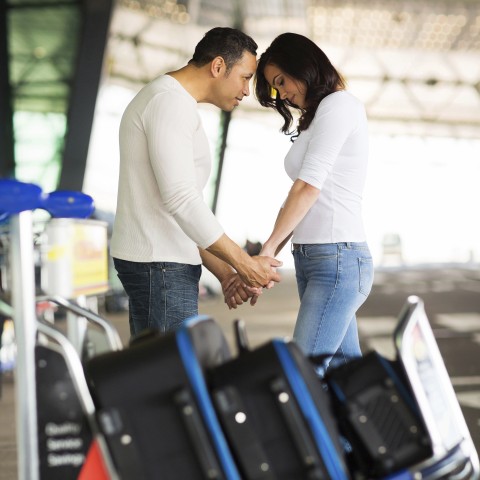
Imagine that you were just introduced to someone, talked with them for a few minutes, and then left the conversation without saying goodbye. What would this person think about you? Saying goodbye in Bulgarian is as important as saying hello and introducing yourself. Here are just a few reasons why:
- Saying goodbye in the Bulgarian language will show that you respect your new Bulgarian friend and his or her language (even if you know very little Bulgarian).
- In addition, it will show your interlocutor that you’re willing to meet him or her again and that you’re interested in pursuing a friendship with them.
- Saying goodbye in their language will make it easier for you to build close relationships with Bulgarians, and they’re likely to trust you more.
In this article, BulgarianPod101.com will teach you everything you need to know about bidding native Bulgarians farewell in their own language. From how to give a formal goodbye in Bulgarian to the best ways to say goodbye to your new besties, we’ll provide you with the words and phrases you need to sound more like a native! Start with a bonus, and download the Must-Know Beginner Vocabulary PDF for FREE! (Logged-In Member Only)
 Table of Contents
Table of Contents
- The Most Common Ways to Say Goodbye
- Specific Ways to Say Goodbye
- Common Goodbye Phrases in Bulgarian That Do Not Contain the Word “Goodbye”
- Cultural Insights Related to Saying Hello and Goodbye
- How BulgarianPod101 Can Help You Learn the Specifics of Bulgarian
1. The Most Common Ways to Say Goodbye

There are many different ways to say hello and goodbye in Bulgarian depending on the situation. It’s important to note that Bulgarian differentiates between formal and informal language, meaning that you should choose your words carefully. Here, we’ve divided the most common Bulgarian goodbye phrases based on whether they’re formal or informal, so you can always choose the perfect parting words.
How to Give a Formal Goodbye in Bulgarian
Before we go any further, how do you know if your relationship with someone is formal? There are generally three stages in a formal relationship:
- The introduction
- Working together
- Getting closer
Now, here are the most common ways to say goodbye in the Bulgarian language for each of these three stages.
Phase 1: Introduction
After you’ve been introduced to someone in a formal situation and talked a while, the best Bulgarian word for goodbye is:
- Довиждане!
Dovizhdane!
“Goodbye!”
This word actually consists of two different words: до (do), meaning “until,” and виждане (vizhdane), meaning “seeing.” It means: “Until I see you again.” Because this is a common Bulgarian word for goodbye, it’s versatile and can be used any time of the day.
Phase 2: Working together
Here’s another formal phrase, which can be used among colleagues or in other formal situations:
- До утре!
Do utre!
“See you tomorrow!”
In particular, you should use this phrase when you know you’ll be meeting the other person frequently. Although Довиждане! is a great phrase to use during your initial acquaintance with someone, it can be considered too formal once you become closer to that colleague. It’s better to use До утре! in this phase of your formal relationship.
До скоро! is another popular phrase:
- До скоро!
Do skoro!
“See you soon!”
You could use this one, for example, on a Friday evening before you leave work for the weekend.
Phase 3: Getting closer
After you’ve become more friendly with your colleagues, it’s time to move forward to less formal goodbyes in Bulgarian. A couple of good options are:
- Ще тръгвам.
Shte tragvam.
“I’ll be going.”
- Приятна вечер!
Priyatna vecher!
“Have a nice evening!”

How to Give an Informal Goodbye in Bulgarian
The most casual way to say goodbye in the Bulgarian language is to say:
- Чао!
Chao!
“Bye!”
Although this word was taken from Italian, it’s probably the most common word Bulgarians use to say bye.
Now, let’s see how to end three different types of informal conversations: with a friend, with a family member, and with your boyfriend/girlfriend.
Situation 1: Conversation with a friend
If you say Довиждане! to your close friend, he or she might find it a bit distant or cold. So here are three ways to say bye to your friends:
- Ще се видим по-късно!
Shte se vidim po-kasno!
“See you later!”
- До по-късно!
Do po-kasno!
“See you later!”
- Чао-чао!
Chao-chao!
“Bye-bye!”
The last expression (Чао-чао!) creates a warm and close atmosphere and shows that you would like to see your friend again in the near future.
Situation 2: Conversation with a family member
If you’re married to a Bulgarian, you’ll have a lot of Bulgarian relatives—from your mother-in-law all the way down to your sister-in-law. Imagine that you bump into them on the street and you start a short conversation:
- → Как си?
Kak si?
“How are you?”
- → Добре съм. Как са децата?
Dobre sam. Kak sa detsata?
“I am fine. How are the kids?”
- → Ходят на училище, учат.
Hodyat na uchilishte, uchat.
“They go to school and study.”
- → Съжалявам, но бързам за работа!
Sazhalyavam, no barzam za rabota!
“Sorry, but I’m in a hurry for work!”
And now’s the time to politely say goodbye in Bulgarian without offending them. Here are two great ways to do that:
- До скоро! Поздрави вкъщи!
Do skoro! Pozdravi vkashti!
“See you soon! Greetings at home!”
- Радвам се, че се видяхме!
Radvam se, che se vidyahme!
“I’m glad to see you!”
- ➢ On BulgarianPod101.com, you can find even more informal phrases to use in your conversations with close friends and relatives.
Situation 3: Conversation with your boyfriend/girlfriend
There are a few specific phrases for goodbye that should only be used between people in an intimate relationship. They’re intended to show your partner that you really care about and love them.
- Пази се!
Pazi se!
“Take care!”
- Ще се видим утре! Обичам те!
Shte se vidim utre! Obicham te!
“See you tomorrow! I love you!”
- Ще си мисля за теб!
Shte si mislya za teb!
“I’ll think about you!”
- Ще ми липсваш!
Shte mi lipsvash!
“I’ll miss you!”

- ➢ You can find some other common ways to say goodbye in Bulgarian on BulgarianPod101.com.
2. Specific Ways to Say Goodbye
Depending on the situation, there are several different ways you can say goodbye in Bulgarian. For example, if you’re only leaving for a few hours, you’ll say goodbye differently than if you were leaving for a long time (or even forever). Here are common Bulgarian goodbye sayings that you can use in a variety of contexts.
Short-Term Goodbyes
Here are five phrases that Bulgarians often use when they’re leaving for only a short while:
- Чао! До скоро!
Chao! Do skoro!
“Bye! See you soon!”
- Ще се видим скоро!
Shte se vidim skoro!
“See you soon!”
- Чао-чао! Пази се!
Chao-chao! Pazi se!
“Bye-bye! Take care!”
- Довиждане! Всичко най-хубаво!
Dovizhdane! Vsichko nay-hubavo!
“Goodbye! All the best!”
- Довиждане! Приятен ден!
Dovizhdane! Priyaten den!
“Goodbye! Have a nice day!”
You might have already noticed that the first three examples are used in informal situations, while the second two are more formal. Below is a situation where you could use one of the formal goodbyes.
Let’s say you’ve just finished eating at a restaurant, and you’re paying for your meal. How would you thank your waiter in Bulgarian, and say goodbye? Here’s what to say to anyone who’s offered you services:
- Благодаря Ви за обслужването! Довиждане и лека работа!
Blagodarya Vi za obsluzhvaneto! Dovizhdane i leka rabota!
“Thank you for your service! Goodbye and good luck!” (Literally: “I wish you an easy job!”)

- ➢ At BulgarianPod101.com, you can learn some more essential Bulgarian vocabulary related to shops and services.
Long-Term Goodbyes
When parting for long periods of time, Bulgarians usually express their hope of seeing each other again. Here are four examples of what you can say:
- Надявам се някой ден да се видим отново!
Nadyavam se nyakoy den da se vidim otnovo!
“I hope to see you again someday!”
- Желая ти всичко най-добро!
Zhelaya ti vsichko nay-dobro!
“I wish you all the best!”
- Остани със здраве!
Ostani sas zdrave!
“Stay healthy!”
- На добър час!
Na dobar chas!
“Good luck!”

- ➢ On BulgarianPod101.com, you can listen to a conversation between Bulgarian friends who are parting ways at the airport.
Saying Goodbye Forever
Parting forever is never a happy event, especially if you love that person. Bulgarians have a special word for this occasion. It’s used when a friend is moving to live abroad, or when they’re dying.
- Сбогом!
Sbogom!
“Farewell!”
This expression consists of two words: the preposition с (s), meaning “with,” and Богом (bogom), meaning “God.” Together, it means “with God,” and it’s like saying “I leave you in God’s hands.”
Ending a Phone Call in Bulgarian
English-speakers often use the common phrases “See you” or “Bye” when ending a phone call. In contrast, Bulgarians have a specific word for ending phone calls. It literally means: “Hear you soon!”
- Дочуване!
Dochuvane!
“Bye!”
Because people don’t “see” each other over the phone, Bulgarians use the word “hear” instead. So instead of Довиждане (До – виждане) (Dovizhdane), they say Дочуване (До – чуване) (Dochuvane).

- ➢ Listen to a real-life phone call that ends with the word Дочуване (Dochuvane).
3. Common Goodbye Phrases in Bulgarian That Don’t Contain the Word “Goodbye”
Did you know that Bulgarians can say goodbye without actually using goodbye phrases like Довиждане (Dovizhdane) or Чао (Chao)? It’s good to know at least some of them, so you can recognize them in your conversations with native Bulgarian-speakers.
- Приятен ден!
Priyaten den!
“Have a nice day!”
- Всичко най-хубаво!
Vsichko nay-hubavo!
“All the best!”
- Всичко добро!
Vsichko dobro!
“All the best!”
- До следващия път!
Do sledvashtiya pat!
“Until next time!”
- До нови срещи!
Do novi sreshti!
“See you soon!”
- Хайде!
Hayde!
“Bye!”
The word Хайде (Hayde) is typically used to mean “Let’s” as in “Let’s do something.” Here’s an example:
- Хайде да отидем на кино.
Hayde da otidem na kino.
“Let’s go to the cinema.”
But when someone says Хайде (Hayde) at the end of a conversation, it means “Bye.” In response, you can simply say:
- Хайде!
Hayde!
“Bye!”
Or:
- Хайде! Ще се видим пак!
Hayde! Shte se vidim pak!
“Bye! See you soon!”
4. Cultural Insights Related to Saying Hello and Goodbye
Bulgarian people are open to foreigners and often invite them into their homes to show their hospitality. If you find yourself invited to a native’s home, be mindful to take off your shoes at the door as this is customary in Bulgaria. If you don’t, you’ll offend your host and they’ll take it as a sign of disrespect.
You should also bring a gift with you; we recommend some fruits or something you cooked. It’s a good Bulgarian custom, showing that you thought of the person who invited you, and prepared something special for him or her.

When it comes to saying goodbye in Bulgarian, you’ll be just fine as long as you know how to use the most common formal and informal phrases. You can use the same phrases regardless of gender, age, or status, which makes things much easier than in other languages like Korean.
The word до (do) helps create a range of goodbye phrases in Bulgaria. Let’s examine some of them here, keeping in mind that you’ve already seen some of these earlier in the article:
- Довиждане!
Dovizhdane!
“Goodbye!”
- Дочуване!
Dochuvane!
“Bye!”
- До скоро!
Do skoro!
“See you soon!”
- До утре!
Do utre!
“See you tomorrow!”
- До нови срещи!
Do novi sreshti!
“See you soon!”
- До понеделник!
Do ponedelnik!
“Until Monday!”
Here, you can replace понеделник (ponedelnik), or “Monday,” with any other day of the week.
5. How BulgarianPod101 Can Help You Learn the Specifics of Bulgarian
BulgarianPod101 is a great source of practical examples and cultural insights, designed to help foreigners know how to use the words and phrases they’ve learned. For example, our goal for this article was to teach you not only Bulgarian goodbye phrases, but how and when to use them correctly.
If you feel like you’ll need some personal guidance to master this topic (or any other topic you’re struggling with!), you can choose a teacher from our MyTeacher program. This native Bulgarian expert will help you get a deeper understanding of the language-related and cultural nuances you’ll need to succeed!
Does saying goodbye in Bulgarian seem easier now than it did before? Or is there something you still have questions about? Let us know in the comments, and we’ll help you out the best we can!










